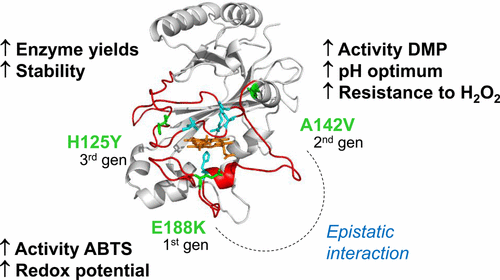
ACS Catalysis paper from CQE highlighted in ACS Select
The work developed by two CQE members, Ana Catarina Sousa and M. Paula Robalo, in collaboration with the Microbial & Enzyme Technology’s group at ITQB, leaded by Ligia Martins and published in ACS Catalysis in May 2017 was selected as one of the 20 publications that highlight recent publications from the Journal of the American Chemical Society, ACS Catalysis, and Inorganic Chemistry that showcase the latest groundbreaking research in the field of “Engineered Biomolecular Catalysts”. (http://pubs.acs.org/page/jacsat/vi/engineered-bio-catalysts?utm_source=JACS&utm_medium=EMI&utm_campaign=PUBS1017EJK).
Engineering a Bacterial DyP-Type Peroxidase for Enhanced Oxidation of Lignin-Related Phenolics at Alkaline pH
Vânia Brissos, Diogo Tavares, Ana Catarina Sousa, Maria Paula Robalo, and Lígia O. Martins*
ACS Catal., 2017, 7 (5), pp 3454–3465
DOI: 10.1021/acscatal.6b03331
Using plants and trees to make products such as paper or ethanol leaves behind a sludge of lignin, a component of plant cell walls. Due to its recalcitrance to degradation, that leftover lignin isn’t good for much and often gets burned or tossed into landfills. Lígia Martins and colleagues set up a directed evolution approach for improving a bacterial DyP peroxidase for the oxidation of lignin-related phenolics. The products could then be used for bulk and fine chemicals, materials, and biofuel. The variant they identify is resistant to high hydrogen peroxide concentrations, overcoming one of the main limitations to the biotechnological applications of peroxidase enzymes. This report highlights the value of directed evolution to generate enzymes with improved properties.
Published/edited: 23/10/2017

